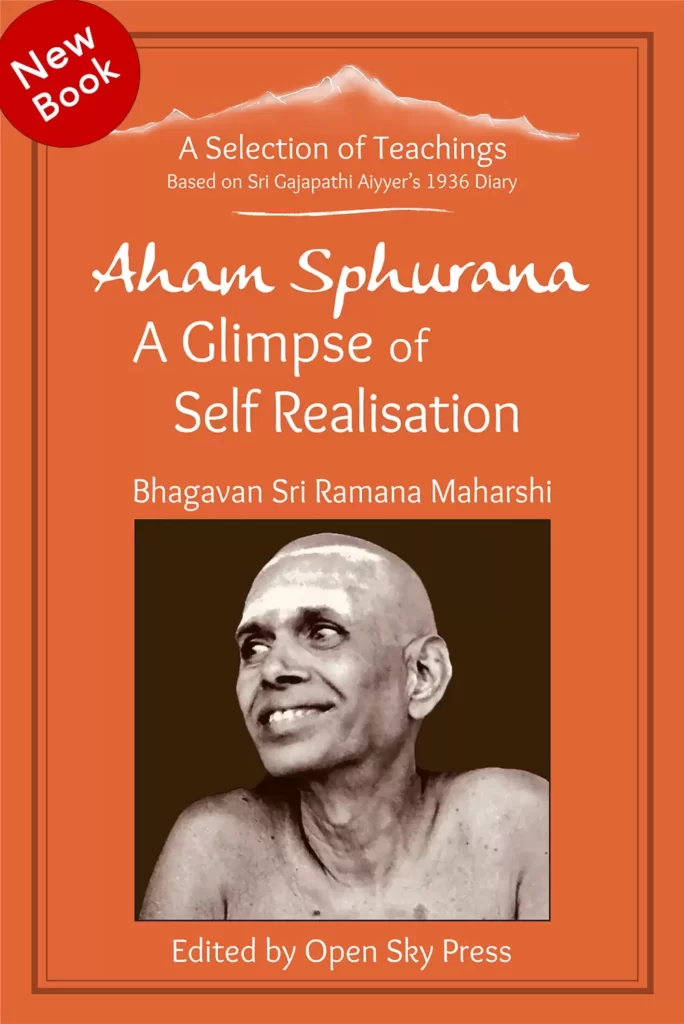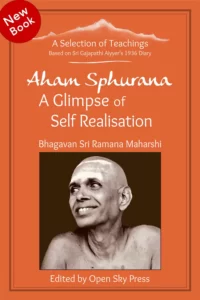
Aham Sphurana
A Glimpse of Self Realisation
New Book about Sri Ramana Maharshi

Available Worldwide
On www.openskypress.com and Amazon:

“In my opinion, Aham Sphurana, a Glimpse of Self Realisation, will become a Treasure Trove of Wisdom to the Seekers of Truth in general, and particularly to the devotees of Bhagavan.”
Swami Hamsananda – Athithi Ashram, Tiruvannamalai
Realise the Self
Q.: Is surrender a means to overcome and vanquish the vasanas, thus resulting in Realisation?
B.: Yes: provided it is unconditional, surrender is a foolproof way to Realise the Self.
Q.: What is the guarantee that I shall Realise the Self if I surrender?
B.: You are missing the point of surrender.
Q.: How so?
B.: To surrender is to let go of everything without anticipating or expecting anything in return. Letting go of everything also encompasses abandoning the aspiration to Realise the Self. Suppose you are holding a red-hot iron-ball. Your hand is quivering in unbearable pain. Somebody suggests unto you that you let go.
If your response is “What benefit will I obtain if I let go?” will not the other person wonder “Poor fellow! The pain of holding that dreadful thing in his hand–has it addled his brains?”
That is how it is to me having now listened to your question. Samsara is intolerably painful. Why look for reasons to let go of it? If samsara still appears as being acceptable to one–no matter however remotely or infinitesimally so–can he Realise the Self? One who does not see samsara as actually being the horribly excruciating misery that it indeed really is–will he Realise the Self?
Q.: Suppose I surrender but yet fail to Realise the Self–what then?
B.: Yes–that possibility is always there from the ego’s point of view.
Q.: But just now you said: “Surrender is a fool proof way to Realise the Self.”
B.: What did the preceding words say? Surrender works only if it is unconditional. That means your mind must be genuinely reconciled to the possibility that anything can happen or not happen, including one’s failure to Realise the Self.
Q.: So success in Realising the Self is made possible only if I wholeheartedly accept the possibility that I may fail to Realise the Self?
B.: Such acceptance must be natural or genuine. For instance, it must not be self-imposed so that the condition “For Realisation to be made possible, the mind ought to stand reconciled to the possibility that anything can happen or not happen, including one’s failure to Realise the Self.” may be attempted to be rendered satisfied.
Q.: The idea sounds complicated.
B.: On the other hand, it is so utterly simple that trying to communicate it semantically leads us into a hopeless quagmire of complicated-sounding ideas. TOTALLY LET GO and the Self stands Realised: that is all there is to Realisation.
Q.: Siddhis such as making the body invisible, making it levitate high up in the air or fly, making it impervious to fire, etc.: do they come to the Jnani automatically?
B.: If such be his prarabdha [Karma], not otherwise.
Q.: Bhagavan is omnipotent. Shall he not utilise his unlimited powers to help the suffering masses of humanity? Shall he not take up an active role in guiding mankind along the proper path to follow–both spiritually and otherwise?
B.: How do you know that I am not doing it?
Q.: But Bhagavan. never left Tiruvannamalai since 1896. Other spiritual heavy-weights in India such as J.Krishnamurti and Meher Baba travel around the world attempting to enlighten people.
TKS.: Those people go around from place to place, but seated at this one corner of the world Bhagavan draws here people from all nooks and crannies of the globe!
B.:The master smiled but did not say anything.
Mr. Snead wanted to know
Q.: How shall I become a disciple of Bhagavan
B.: If you continue in my word, then you are my disciple indeed; and you shall know the truth, and the truth shall make you free. Sincerely follow Bhagavan’s teachings and you are Bhagavan’s devotee.
Q.: So, those who sedulously follow his teachings are deemed to be counted as being amongst Bhagavan’s disciples. May we proclaim to all that Bhagavan has said so?
B.: [smiling] Yes.
Q.: How to escape from sin that I have already perpetrated, which causes a series of painful rebirths according to Hindu philosophy?
B.: “For the law of the Spirit of life in Christ Jesus hath made me free from the law of sin and death.”
Q.: Will faith in Jesus suffice to save me from sin?
B.: All that is necessary is to Love Him with all your heart. Your Love is its own reward; you need crave none other.
Q.: There are times when despondence grows over me like an ominous, thick cloud. I feel as though an inky blackness were steadily enveloping me, about to carry me away to my doom. I am so petrified with terror on these occasions that it does not even occur to me to introduce a comforting counter-thought which might have the effect of doing away with the fear.
I have, countless times, reminded myself that I ought to try asking myself “Who becomes aware of this unpleasant sensation?” on these occasions, but it is of no avail–every time this paralysing terror overtakes me, I am unable to think of anything else. Please provide me with a useful technique that I would be able to follow whenever I am besieged with such horrific mental states.
B.: When such a thing happens, stop trying to fight with it; instead, observe it with diligent calmness until it has dissipated. The feeling as though one is suffocating arises because one is trying to protect oneself from harm. But so long as there remains a “you” who desires not to be harmed, thus long will it remain possible for you to become threatened with harm.
Give up the idea that you are precious to yourself; and give up the idea that you ought to stay free from harm. After all, what is it that can be harmed? Only the perishable body and mind, which are doomed to disappear one day. Knowing that there remains a Self available for Realisation by you that is indestructible and imperturbable, why should you become terrified at the prospect of the body and mind coming under harm? Whatever it is that the environmental or mental circumstances might happen to inflict on you, remain equiponderant in mind, knowing that it is all transitory and unreal.
Q.: How to deny the reality of the world whilst yet remaining in it?
B.: As you go on with your sadhana [practise] to introvert the mind, pure Subjective Consciousness alone captures your attention and information obtained through sensory perceptivities [i.e., the world] begins to gradually fade out from your mental view.
Q.: In that case, the worldly life can be expected to become impossible.
B.: No. If the burden is thrown on the Higher Power, the body’s destined actions, as ordained by prarabdha, are found to go on automatically. It is the experience of the mind that has unreservedly surrendered itself that the faculty of intuition has wholly taken charge of the intellect and directs its functioning on a moment to moment basis.
Q.: Can a cowardly wretch like me ever find the courage to surrender everything and utterly throw myself at the feet of the Almighty without second thought?
B.: The state of absolute surrender, being not different from Jnana, is impossible for the man on the Clapham omnibus to straightaway resign himself to; that is why vichara is suggested as a tool with which to gradually turn the mind inwards.
Q.: The objective of vichara is to destroy the ego. Am I correct?
B.: What does not exist cannot be destroyed. What really exists cannot be destroyed, because it is immutable and imperishable. So, where is the question of destroying anything? Experience of mind is a self-contained illusion; all that is necessary in order to dissolve it, is that you look properly at it: then you find out that it was never there.
At twilight, a lamp-post situated in a corner of the road may trick you into believing that some crook is standing there, waiting to spring upon you and attack. Hurrying so as to run away from the spot will not help, because at every corner you turn you will meet with the same disturbance. There is only one way to overcome the problem: stand still and face it.
Look at the crook closely. Then you discover that there never was any crook. That all along only an innocent and harmless lamp-post had been standing there. Did the crook disappear? No: he never existed. All along he was there only in your imagination. Likewise is it with the ego. It is a non-existent foe who gives us so much trouble. Look continuously at the mind and it will disappear, never to have existed. Continuous search for the mind results in its disappearance.
Edited by John David Oct 2021







